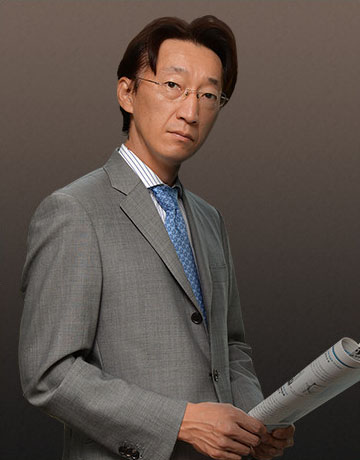

Born in Kyoto. In university, member of Sports Council's American Football team for 4 years and lived fulfilling student life. After graduation, travelled to USA to study accounting. Acquired Master of Business Administration from a Graduate School in New York. Embarked on career as an accountant at Arthur Andersen, one of the six largest accounting firms at that time. After that, returned to Japan and joined American-affiliated real estate investment company and investment banking department of banks. Later, assumed office of Representative Director of Sakura Asset Management Corporation. Carries out hybrid business activities by conducting investments using our own balance sheets while conducting consulting work, advising both domestic and overseas investors.
What do you see as your strength?
From the experience I have accumulated to date with accounting and financial work for global corporations, equity finance for real estate and corporations, and other activities, I have provided investment advice, set up investment structures, and provided consulting services to foreign clients. None of the investment projects (including those where I provided advice) I worked on in the past generated losses, and in the future I wish to carry out investment activates with full control of the risk-return tradeoff.
Why do the wealthy like to invest in real estate?
I don't think that all of the wealthy people like real estate, but it is an undeniable fact that almost all wealthy people own a certain amount of real estate. I think that is because it is a form of investment with stability and resilience as real assets and which has two sides to it, active investment and preservation. For example, Mr. A and Mr. B live next door in the same apartment building. Mr. A purchased, while Mr. B rents. Ten years later, they relocate. Mr. A has sold his condominium and Mr. B has terminated his rental lease. Under normal circumstances, the one left with available cash is, of course, Mr. A.
What is the difference between stock investment and real estate investment?
The difference in investing in listed stocks and investing in physical real estate is the engagement with the nature of the target investment. In other words, by nature I mean that in extreme terms, stocks represent a corporate organization which is a collection of people, and real estate is after all something physical. Also, by engagement, I mean that investment in stocks is, excluding some exceptions, going with the flow of what other people do and decide, without you being able to make decisions on your own. Real estate involves investing where you make your own decisions. With stocks, even if you own 100% of what you invest in, as long as there are people involved, things could happen that you never expect. Real estate investment reflects 100% of the desires of the investor. With investment in companies, there are things that you cannot see, while with real estate, there are not.
Why do some people succeed at real estate investment, while some fail?
I think that the people who succeed have a good sense of the tradeoff between risk and return, are action-takers, and excel at communication. The risk-return tradeoff is indispensable for making judgements such as whether a property is good or bad and its locality. People who can't take action will hesitate, no matter how good a property presented to them is. Furthermore, the ability to communicate effectively is an absolute requirement in order to be able to acquire good property information from real estate brokers.
And, what about the thinking and tendencies of foreigners with regard to Japanese real estate?
After the Bubble Economy burst, there were many instances of them recognizing the market as being "stable." Even when small bubble economies appear repeatedly, the Japanese real estate market is considered to be one of the few among advanced nations in the world where investments can be made with expected and predictable results. For investors who invest on a global scale, Japan is probably a market you cannot pass up in terms of portfolio strategies. Over the past few years, there has been a tendency for expectation of growth to attract somewhat strong investors. On the other hand, as a whole I think that the breadth of investors has expanded. Even if there is a certain number retreating from the market before and after the 2020 Tokyo Olympics, I think that in terms of the number of investors, there will definitely be an increase.
How do you spend your days off?
My son plays baseball, so I chase after that white ball as much as he does, taking part in his practices, and umpiring when there is a game. When he is off to baseball camp in the summer, there were times that I recalled the camps I went to as part of my university activities, and I got depressed. But then I realized that I'm not the one who practice baseball and I felt better. I like traditional Japanese handicrafts and I like to visit the various locations in Japan where they are produced.